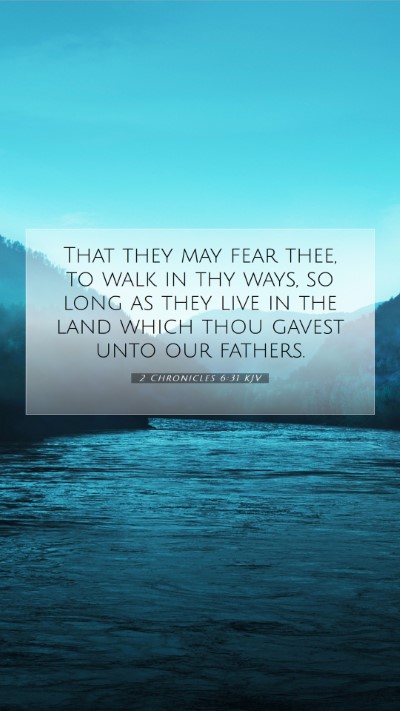Bible Verse Meaning of 2 Chronicles 6:31
2 Chronicles 6:31 states, "That they may fear thee, to walk in thy ways, so long as they live in the land which thou gavest unto our fathers." This verse is part of King Solomon’s prayer at the dedication of the temple, emphasizing the importance of reverence and obedience to God.
Overview and Context
This verse is set during a pivotal moment in Israel’s history when Solomon, having completed the temple, seeks to establish its purpose in the lives of the people. The dedication ceremony is not merely a physical inauguration of a building but a spiritual commitment from the community to live according to God's covenant.
Meaning and Interpretations
- Fear of God: The "fear" mentioned here refers to a deep, reverential awe of God. It is not a fear that drives away, but one that draws believers closer, encouraging them to respect God's authority and power (Barnes). This notion is echoed in various biblical passages (Proverbs 1:7; Isaiah 11:2), which highlight the fear of God as the beginning of wisdom.
- Walking in His Ways: To "walk in thy ways" signifies a lifestyle aligned with God's teachings and commandments. It implies active obedience and a choice to follow the divine path laid out in the Law (Clarke). The life of a believer is characterized by continual action in accordance with God's will, as seen in Psalm 119:105, which refers to God’s Word as a lamp to our feet.
- Longevity in the Land: The blessing of long life in the promised land is contingent upon faithfulness to God’s commandments. This reflects the covenant relationship where blessings are tied to obedience (Henry). Deuteronomy 30:16 reinforces this, stating that life and prosperity come to those who love God and follow His ways.
Commentary Insights
Matthew Henry: Henry emphasizes that Solomon's desire is for the people to maintain an enduring relationship with God, which would manifest in their everyday conduct. He reveals how human actions are influenced by their understanding and reverence for God.
Albert Barnes: Barnes points out that the essence of this prayer during the temple dedication embodies a desire for spiritual stability. He correlates the longing for fear and respect towards God with a sustained commitment to righteousness, which is foundational for a flourishing society.
Adam Clarke: Clarke interprets the verse as a prophetic outlook of Solomon, recognizing that true blessings for Israel depend on their collective adherence to God's law. He highlights that Solomon understood ancient Israel’s history and how straying from God's paths always led to decline and difficulty.
Application of 2 Chronicles 6:31
For modern believers, this verse serves as a reminder of the importance of maintaining a respectful and obedient relationship with God to experience His promised blessings. In a world filled with distractions, Christians are called to seek a deeper understanding of Scripture and commitment to God's will in both personal and communal contexts.
Related Bible Cross References
- Deuteronomy 5:33: "Ye shall walk in all the ways which the LORD your God hath commanded you." This verse reinforces the idea of obedience to God's laws.
- Psalm 128:1: "Blessed is every one that feareth the LORD; that walketh in his ways." It echoes the blessings tied to fearing God and following His commandments.
- Proverbs 10:27: "The fear of the LORD prolongs days: but the years of the wicked shall be shortened." This illustrates the longevity aspect associated with fearing God.
Conclusion
The study of 2 Chronicles 6:31 deepens our Bible verse understanding and reveals the intertwining of reverence for God with the practice of righteous living. Seeking Bible verse explanations as reflected through the analysis of this verse provides insights for both individual and corporate spiritual growth.
Further Study Recommendations
For those involved in online Bible study or Bible study groups, exploring the contextual significance of such verses can foster rich discussions. Utilizing Bible study tools such as commentaries, exegetical resources, and historical texts will enhance the learning experience.


